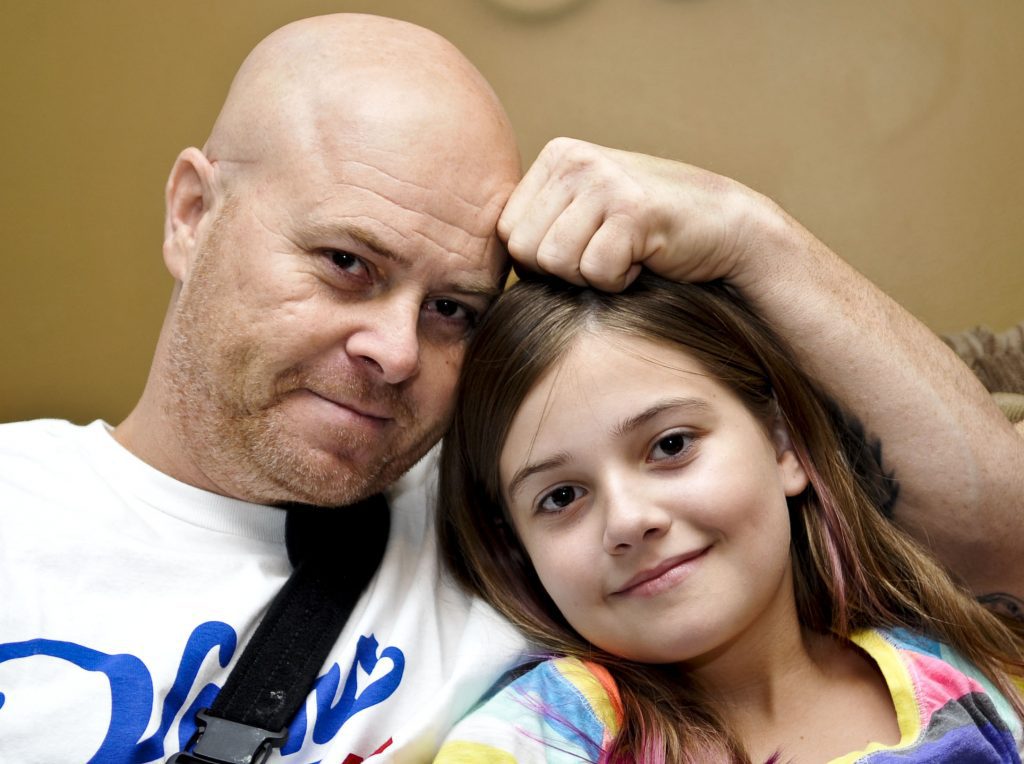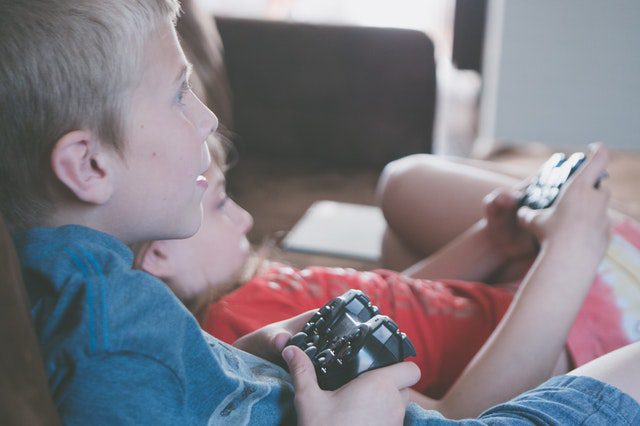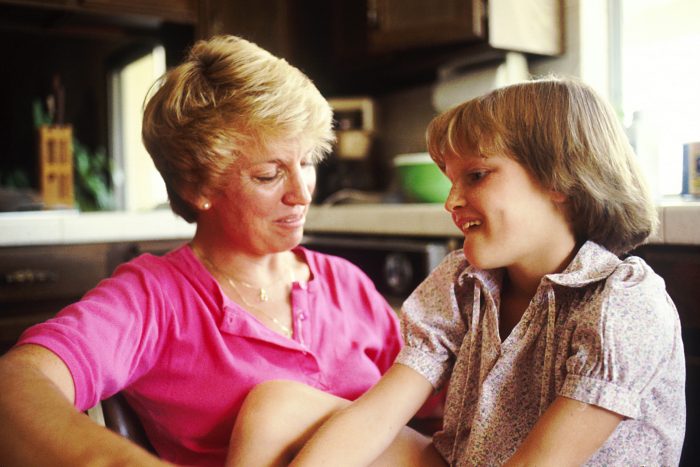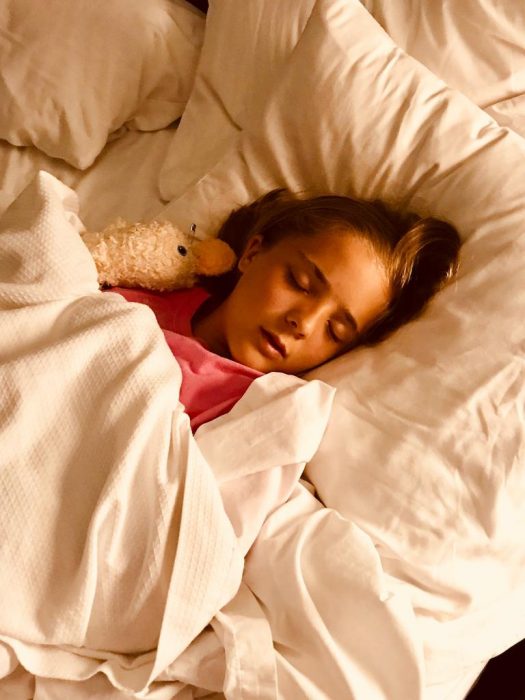When you think of a nine-year-old, you tend to imagine a kid who is a little more independent. This is someone who is on the verge of having two digits in their age, and are almost near the preteen phase. Some 9-year-olds can function quite well when home alone, but you do have to remember that they’re kids, and it’s possible for them to regress into what feels like an earlier stage of their life. There may be some scary thoughts that lead to sleep problems.

In particular, a 9-year-old may become afraid to sleep alone. They may wake up in the middle of the night and come to sleep next to you. You may wonder why. This is a problem you had when they were two, not nine. What is going on here? Are they afraid of the dark? Are they having bad dreams?
What is happening is quite common, and we will explain why.
Your Kid Is Getting Smarter
That’s one reason why this happens. Now, what do we mean by this? At nine, your child is able to think more critically but hasn’t adopted complete rational thinking yet. As a result, they may visualize scenarios like a burglar coming in, or something bad happening if they fall asleep. These are scary thoughts that are part of a nighttime anxiety issue.
A 9 year old afraid to sleep alone may realize that they are still a kid, and they want the comfort of their parents to help them out. This is how many kids are programmed, and when they are aware of their parents, they may seek the help of them. If they are having trouble trying to fall asleep, children will sometimes move to where their parents are to solve the problem and feel safe.
Often, not being able to sleep alone is due to a bad sleeping habit that needs to be broken, such as always worrying about grades, or playing video games a bit too close to bedtime. If this is what you discover to be the issue in your home, you need to work on establishing a good bedtime routine and try to minimize any anxiety at bedtime. Don’t have any serious talks about topics that elicit anxiety from your child. If they’re afraid of the dark, put a night light in their room, and let them know it’s time to start getting ready for bed with plenty of time so there’s no stressing about time by them or you.

Is There A Psychological Problem To This?
You may wonder about your child’s anxiety. If they have bedtime anxiety, is it a sign of something bigger? Some deep problem in their mind like anxiety, depression, or a grand fear? Usually, that’s not the case. But it could be that you do have an anxious sleeper that does get nighttime anxiety.
However, because parents may want to keep the peace and make their child feel like they’re less in danger, they may still let their child sleep with them. While this has good intentions, the problem is when the child develops a habit out of it. Kids fall into patterns easily. For a child that already has a sleep problem, you don’t want to complicate that for later when you have to break this pattern. You do need to break the habit and let the child have independence, though. So, how can you do this?
Steps To Help Your Child Sleep Alone At Night
- Make Sure They Are Having a Good Wind-Down Routine
At nine, your child may become a little more independent, and thus, have sleep rituals that are not so great. They may play a lot of games or watch TV too close to the bed, keeping them all wound up. You may want to make sure your kid has a good wind-down routine going. Make sure all the lights are out, they take a nice, hot bath, and they enjoy themselves before falling asleep. Don’t underestimate the importance of a good bedtime routine—something many parents overlook.
The concept of the bedtime story was born from the need for a wind down for children at night. Choose a bedtime story that makes positive associations about going to bed and other subjects. Don’t pick one that will give your child any kind of scary thoughts and add fuel to bedtime fears.
Make sure your child is going to bed the same time every day, and make sure they aren’t using the bed for more than sleep. What do we mean by this? If your kid is jumping on the bed, eating snacks on there, and doing everything else but sleeping on the bed, it can make your child associate the bed with energy and not sleep. By having a good routine, your child can feel better. This applies to adults as well. If you can’t sleep, it may be time for you to consider your routine and stop looking at your phone so much. Adults have a worse problem sometimes. Nighttime anxiety can affect everyone, so anything you can do to make things better on you and your kids is what you should be doing.
- Have A Discussion On What’s Bothering Them
Figuring out why your child is having a problem is probably the best way for you to help. When your child can’t sleep, having a groggy conversation is probably not the best route. Instead, talking about what’s bothering your kid when you’re awake may be the solution you’re looking for. They may have worries and other concerns. They may tell you they’re afraid of the dark. It could be your child is afraid of something else.
It’s important you talk about their worries and try to take them seriously, even if you find their worries to be a little silly. Sometimes, kids can be worked up about the silliest things, but you do need to take them seriously, as talking down to them can make the problem worse. Simply telling them not to worry about whatever it is doesn’t work. You need to give your child the chance to be heard about whatever it is that bothers them.
Once you discuss the worries, try to come up with solutions. You may end up talking to your child about what you can do to resolve some problems, and you may come up with solutions together. If your child is worried about something in school, study together or talk to the teacher. By tackling the root cause, you may be able to relieve any symptoms. Try to make positive associations for whatever it is that’s giving your child nighttime anxiety. Maybe you can stop them from having those worry sessions in the middle of the night.

- Try Not To Give In
It’s important that you don’t let your child sleep with you whenever they’re having problems sleeping. Sometimes, that can be hard to do, and if you do it once or twice, it probably isn’t a huge deal. However, making it a habit is not the solution. Instead, you need to figure out ways you can put your child back to bed should they wake up. Try winding them down again. You can read another bedtime story. Be loving, but also firm that it’s time for bed. Your goal should be to get your child to sleep in their own bed. You may be very tired when your 9 year old daughter comes to your room trying to fall asleep in your room. It’s so important that you don’t give up and let her.
It’s okay for your child to feel this way, but they do need to realize that bedtime means bedtime. It’s also good for them to understand that mom and dad are there for them, but their bed is not open for anyone to come sleep in whenever they have a sleep problem. By practicing a love that is firm, it can help your child get over their fear. Take them back to their rooms and get your kids to sleep in their own beds. You can even stay with them until he or she falls asleep.
And remember, this is usually a phase, and they’ll soon be able to sleep alone. For some kids, all they need is a night light, their favorite stuffed animal, and a little reassurance from mom and dad to feel safe. Then they’ll be sleeping like champs.

- You May Need Help
If you’re still having problems putting your kid to bed, only for them to wake up with a problem, seeking help may be your best solution. There is no shame in talking to a counselor or a therapist. They may be able to determine if your child has a possible sleep disorder, a phobia, or another mental health problem that is preventing them from getting a good night’s rest.
Sometimes a sleep problem can be much more than just a child being afraid of the dark or experiencing simple bedtime fears. You may need a professional to help you so your child can learn to sleep in a more healthy manner and in their own room. Mom and dad aren’t always qualified to handle a sleep problem if it’s on a deeper level.
Talking to a therapist isn’t a sign you’re a bad parent, but instead proving that you’re able to help your child deal with their problems. The therapist can even teach you how to make positive associations at bedtime for your child. They’ll help you understand how to help your kiddo fall asleep and stay asleep, as well as how to get back to sleep should they wake up in the middle of the night. In trying to help your child, you may also learn to sleep better.
Conclusion On 9 Year Old Is Afraid To Sleep Alone
Children who start to come in your room and try sleeping with you in your bed could be doing so for many different reasons. Whether your kiddo feels scared of something irrational, is afraid of the dark, or has anxiety over things in their life, you need to make it your goal to help them fall asleep back in their own bed. Once your child falls asleep, you can return to your own bed. The best thing for you and your child is to have your own separate sleeping spaces, and for them to learn how to get themselves back to sleep in their own bed when they wake up in the night.
9 Year Old Is Afraid To Sleep Alone FAQs
What do you do when your child doesn’t want to sleep alone?
You can sit near or beside your child’s bed until he or she falls asleep. Over several nights, make an attempt to move away from her gradually. Usually, once they fall asleep, you can leave without issue. They just want to feel safe when they’re still awake.

How can I help my 9-year-old sleep through the night?
To help your child, you must first know how much sleep your child should be getting then make bedtime a routine. Create an ideal sleeping environment by turning off electronics and avoiding late meals and caffeine. You can design a program for bedtime and then stick to the bedtime routine every night to create continuity. More helpful ways available here: https://www.cincinnatichildrens.org/health/b/bedtime-fears
What age should a child sleep in their own bed?
By the time the children reach the age of 2 to 2 1/2 years old, you should encourage your child to sleep through the night in their own beds. You can actually keep them in their own beds from infancy. If you set the precedent that sleeping with mom and dad in their bed just isn’t an option, then they will learn to sleep in their own bed from the very beginning. Kids fall into patterns easily, so just don’t start that pattern.
What time should a 9-year-old go to bed?
9 year-olds should go to bed between 7 p.m. and 9 p.m. Usually a 9 year old falls asleep pretty quickly, still. So, a bedtime of 8 or so will serve you well.
How much sleep should a 9-year old have?
Children around seven to 12 years olds should get a minimum of 10-11 hours of sleep. That means if your child wakes up in the middle of the night often and can’t fall asleep again, they’re losing a lot of valuable sleep time that they need. If you have a child that’s afraid of the dark, make sure they have a night light so they don’t stay up once they wake up in the dark. It also might be helpful you allow them to sleep with their favorite stuffed animal so they have something to cuddle with should their bedtime fears start to bother them.

Is it OK for a child to sleep with parents?
Co-sleeping is perfectly safe for a 9-year-old afraid to sleep alone. However, it can create an undesirable affect. It’s better for you to take your son or daughter back to their room and wait until he or she falls asleep in their own bed. Then you can head back to your room. Most of the time, once you get a kid to fall asleep, they’ll be fine. If it helps, you can run through your regular program for bedtime to try and get them back to sleep.
Last Updated on June 25, 2022 by Jejomar Contawe
DISCLAIMER (IMPORTANT): This information (including all text, images, audio, or other formats on FamilyHype.com) is not intended to be a substitute for informed professional advice, diagnosis, endorsement or treatment. You should not take any action or avoid taking action without consulting a qualified professional. Always seek the advice of your physician or other qualified health provider with any questions about medical conditions. Do not disregard professional medical advice or delay seeking advice or treatment because of something you have read here a FamilyHype.com.